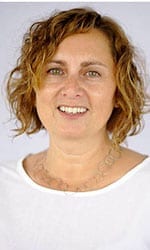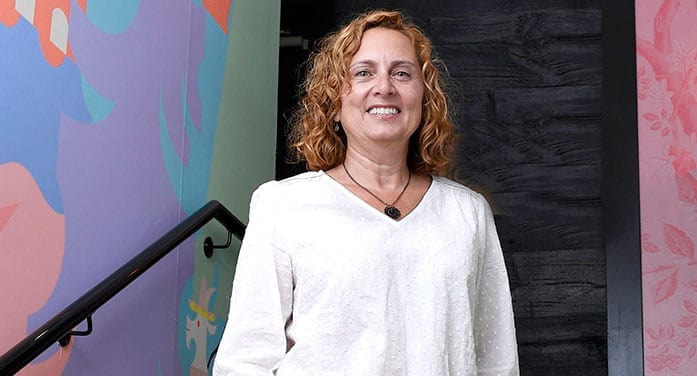Kristina Milke remembers receiving an email in 2013 from the alumni office at her alma mater, wondering whether she might stop by the University of Alberta to meet with Ray Muzyka of BioWare fame about a new mentoring opportunity on campus.
“I was really excited – what an opportunity for me to get some business mentoring,” said Milke. “I knew of Ray; he’s a legend in Edmonton.”

She said she met with Muzyka and Ashlyn Bernier, the program manager at the time, and talked about a new entrepreneur mentorship program being developed for U of A alumni, based on a program from MIT in Boston.
“We talked about how this was an awesome idea, and in my mind I was excited about the idea of getting mentored. And then at the end of the meeting he said, ‘Great, would you be one of the founding mentors?’
“I couldn’t believe it, I was really honoured,” she said. “Of course, I said yes.”
It was then that Milke, who recently followed in Muzyka’s footsteps as chair of that program – the ThresholdImpact Venture Mentoring Service (VMS) – began to take stock of all she had accomplished in the world of business since graduating from the U of A in 1994 with a bachelor of commerce degree.
“I didn’t go to university straight out of high school; I chose to go to take a job with Enbridge, formerly Interprovincial Pipelines,” she said.
Despite taking a break from school, university loomed on the horizon. Milke began taking night classes in business before making the jump to the U of A.
“My university years have been some of the best years of my life,” she said. “In my last year, three of my friends and I did an exchange program to Sweden at Uppsala University together. Living, studying and travelling through Europe, we became lifelong friends with all of the exchange students from around the globe.”
Upon graduation, Milke joined Ernst and Young, where she would earn her chartered accountant designation.
From there, she worked in the oil and gas sector for a year before catching on with Spar Aerospace as the controller, working on multimillion-dollar government contracts retrofitting and maintaining Hercules aircraft from around the world.
After seven years there, Milke got her first taste of the tech sector by joining Intuit, an American business and financial software company, to run their finance group in Canada.
She said she really loved working for Intuit, but after about three years of tenure, they decided they wanted to have all their executives in Toronto.
“I said, ‘No thanks, I’m from Alberta, I’m not moving to Toronto.’”
Milke was also ready to move on from finance to something more operational. In 2008, she signed on with Investopedia, which was founded in Edmonton by U of A business grads Cory Wagner and Cory Janssen in 1999. The pair were in the midst of a two-year post-acquisition contract after selling their brainchild to Forbes Media.
When they left, Milke was named CEO and reported directly to Tim Forbes in New York, while running sales teams in New York, San Francisco and Chicago, as well as the operations team in Edmonton.
It was at that point that she tried her hand at angel investing in tech startups. Milke said what attracted her to this asset class was the excitement generated by tenacious people who give up everything to drive their world-changing ideas forward.
She also loved the opportunity to get involved early in ventures in a variety of ways, from being a passive investor to something more hands-on depending on the startups’ needs.
“It is absolutely fascinating, inspiring, energizing and infectious all at the same time,” said Milke, who was involved with an angel investment group for several years and is now in the process of launching Sprout Fund II, which has designs on being the first of its kind and size in Edmonton and will continue to focus on early-stage tech companies in Western Canada.
“All big companies start as a small business, and we need to have all hands on deck to help to compete on the global stage.”
What Milke loves about investing financially in good ideas mirrors her love for investing her time personally in the entrepreneurs involved in VMS.
“Over time, there’s a lot of trust that’s built. The entrepreneurs often come to the mentors, and they have real professional and personal issues – like how you balance being an entrepreneur with your family,” she said.
Having served as a vice-chair and on numerous VMS committees, Milke said she has grown with the program, whose mentor numbers have swelled from 20 to 120 in her eight years.
What differentiates VMS from accelerators or other mentoring organizations is that the success metric is not whether the companies grow, become profitable or get more profitable – it’s about whether the entrepreneurs grow and develop, she stressed.
“VMS is about creating a community that’s there to help,” she said. “There are so many opportunities to learn from people all the time, and everyone involved is so generous with their time.”
| By Michael Brown for Troy Media
This article first appeared in Folio, published by the University of Alberta. Folio is a Troy Media![]() Editorial Content Provider Partner.
Editorial Content Provider Partner.
COMMUNITY NEWS OUTLET ACTION PLAN!
WEBSITE HOSTING AND ALL TROY MEDIA EDITORIAL CONTENT POSTED TO YOUR SITE DAILY FOR ONLY $129.95 PER MONTH.
Limited time offer: Get your first 2 months FREE! Click here for details
